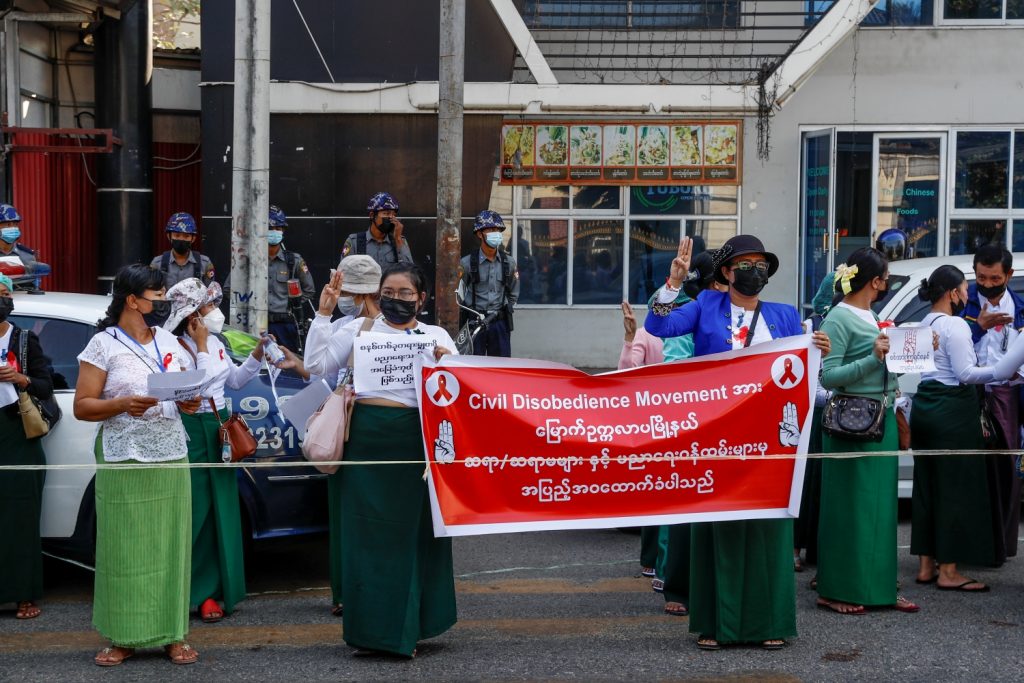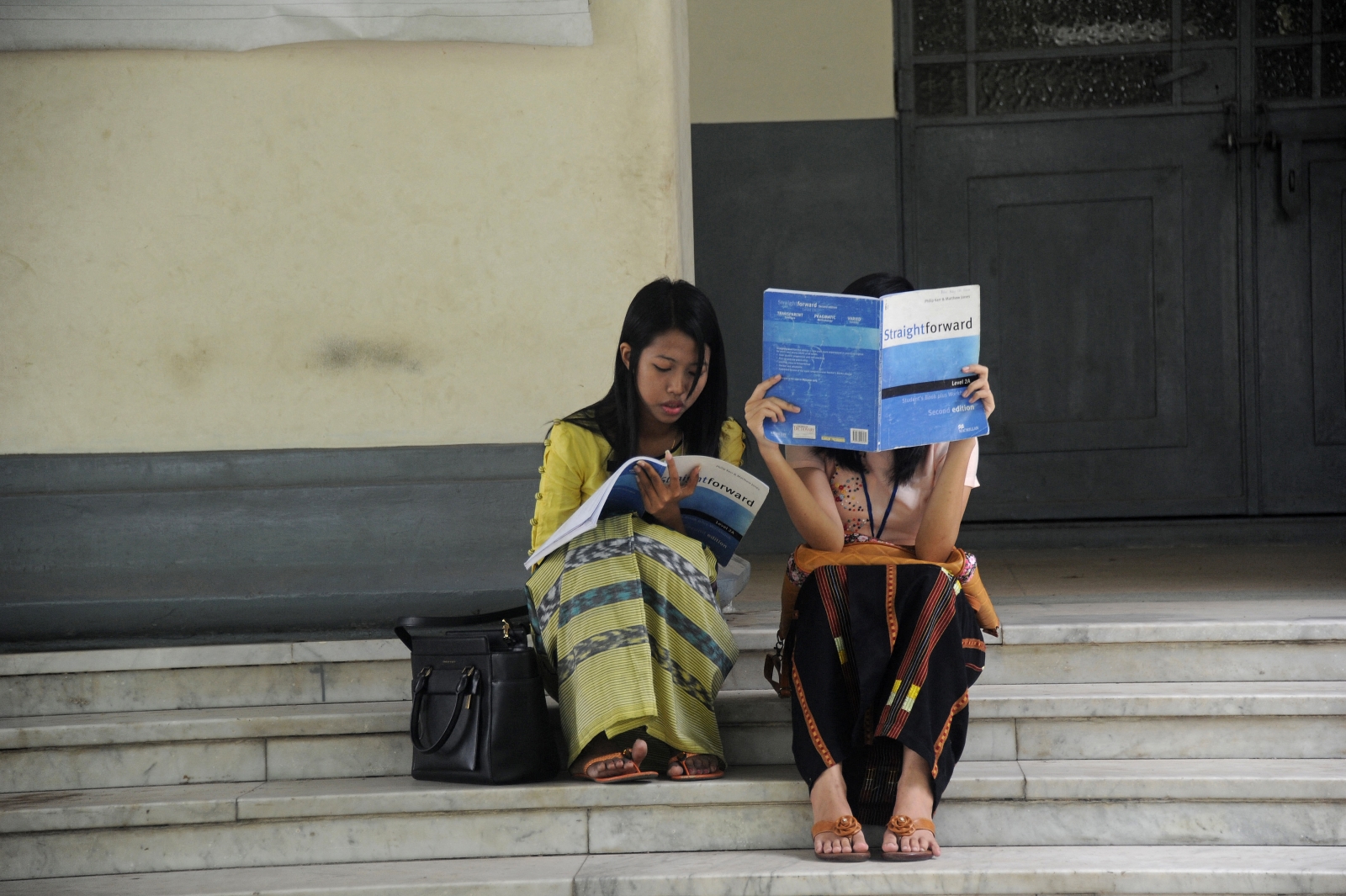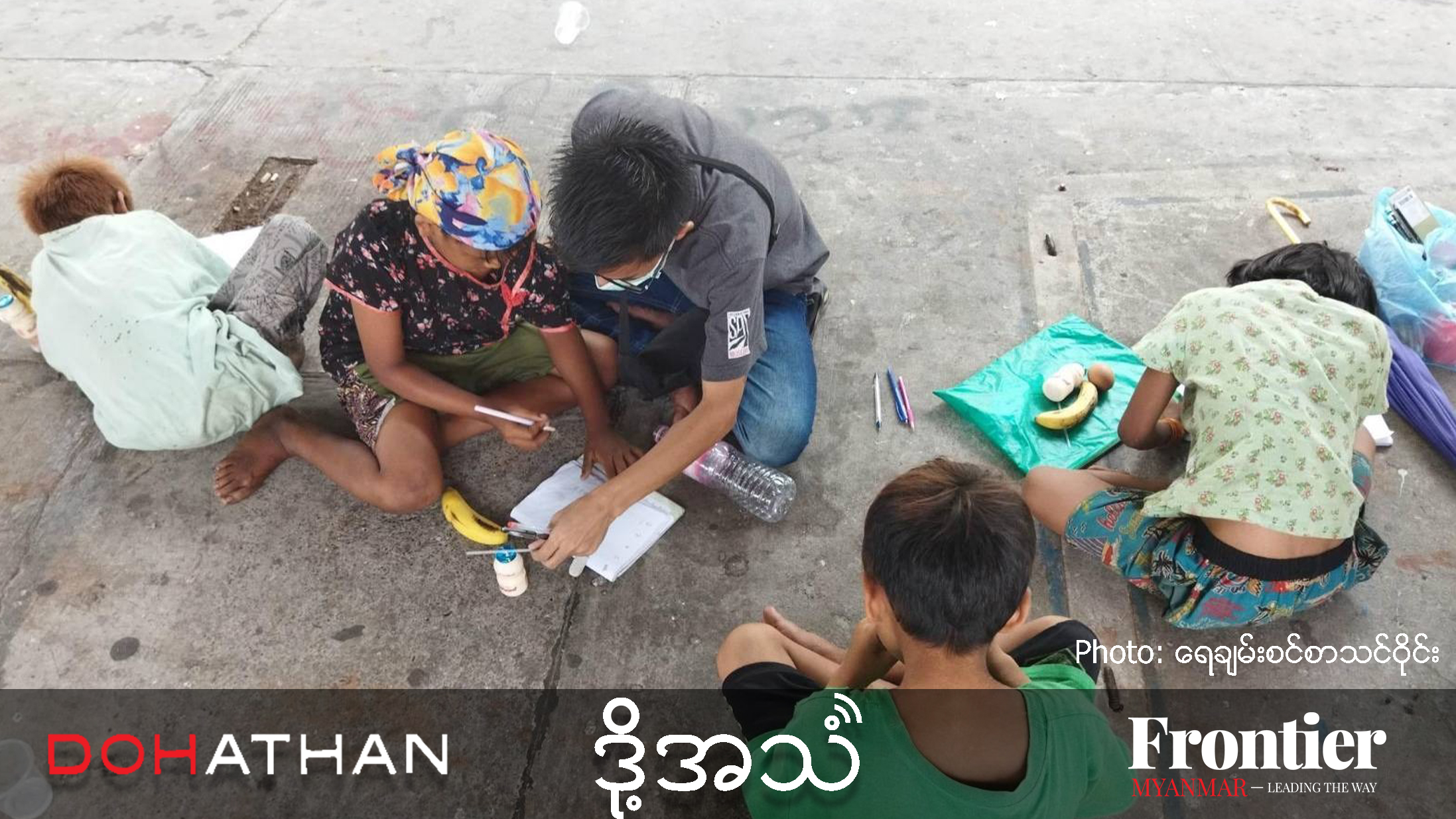As Myanmar’s universities reopen, the regime is returning to the decades-old playbook of previous regimes in an effort to turn a generation of students into pacified subjects.
By MARY CALLAHAN | FRONTIER
As Myanmar endures a nearly nationwide civil war, the State Administration Council, as the junta calls itself, is stealthily wreaking massive damage across all service sectors. And few sectors have been hit harder than education, where the military is following in the footsteps of previous regimes to gut an already compromised education system and, in the process, raze any dreams that parents and students had for the future.
Page one of the 60-year-old playbook for military education policy: announce the reopening of schools. Do this despite the fact that most qualified teachers are unwilling to teach and most parents don’t want to send their kids back to the classroom – either because they do not want their children to be part of the “military slave education system”, or because they are afraid of schools becoming targets of violence.
For coup-backed education ministries, a teacher shortage has never been a problem. The playbook is clear: simply run an advertisement seeking fresh applicants, and set significantly lower job requirements. And when there is still a shortage, dress up female members of the pro-military Union Solidarity and Development Party and military wives and daughters in green and white teachers’ uniforms and ferry them to school.
A student shortage is a bit more problematic for the SAC’s scripted theatre of a “return to normalcy”, but the playbook provides an answer: send armed forces out on so-called “household list” checks, take photos of kids’ names on lists and deliver them to school principals to verify enrollment. Require parents to submit photographs of everyone living in the house and threaten to “check back” (read: conduct a potentially deadly raid) when principals report low enrollment rates.
The actions taken by the SAC since the coup echo the strategies that previous juntas employed to transform education into a means of training subjects to accept military rule, rather than as a means of creating educated citizens.
Reeducating teachers
Until the coup, the educational reforms undertaken by the USDP and the National League for Democracy governments had given people hope for better schools for Myanmar’s children. Positive changes were being made, and the quickening pace of political reforms attracted dozens of technical foreign experts to join Myanmar education officials in an education reform process underwritten by Australia, Japan and UNESCO.
Despite the reforms, much of the legacy of previous junta policies remained. In 2019, education anthropologist Rosalie Metro examined the newly revised Grades 1-3 textbooks and found “much to commend”, but also little progress toward inclusion or the questioning of rigid hierarchies. And despite the desires of many teachers, parents and students, education has changed very little, with emphasis on the rote learning, homogeneity and unity that plays to the SAC Ministry of Education’s motto, “national discipline starts from the school.”
Higher education interventions by the SAC follow the pattern set by past juntas. As in 1962 and 1988, this junta has also closed the universities and fired the teachers who did not support the coup.
After the State Law and Order Restoration Council takeover in 1988, it took a whole-of-government approach to eliminate naysayers. In 1991-92, all civil servants including higher education faculty were required to respond to a survey, infamously known as “The 33 Questions.”
The questions included: “Do you support NLD leaders U Tin U, Daw Su Kyi…? Can you accept that all civil servants must be free from party politics? If not, explain why. Do you know that violating civil servants’ rules and regulations can lead to being dismissed? Is it appropriate to elect somebody who is married to a foreigner as the Head of State? If appropriate, how will the situation of the country become?”
I was living in the Institute for Education compound and eavesdropped daily at the only tea shop there, as whole departments – mostly consisting of women – convened to debate and decide whether to answer truthfully or give the “right answers”. In departments such as the English Department at the Institute for Education, most of the faculty resisted, giving honest answers that led to immediate dismissal, eviction from housing and general blacklisting.
Penny Han Tin, who taught English at the Institute for Education, where her husband served as a SLORC-appointed rector, called me to her table on one of those days and spent hours explaining the blow-by-blow desecration the military had inflicted on education, students and the integrity of faculty. She answered truthfully, and her own husband fired her.
Once culled and repopulated by loyalist faculty, all who remained employed under the juntas’ higher education institutions were sent to “refresher courses” on disciplining students and memorizing state slogans. The SAC has revived this practice, trying to “teach” teachers and students about their duty to realise the SAC’s “Nine National Causes”, which include “To build a Union based on democracy and federalism, through a disciplined and genuine multiparty democratic system that is fair and just” and “To ensure a strong and dynamic Union spirit, the genuine spirit of patriotism.”
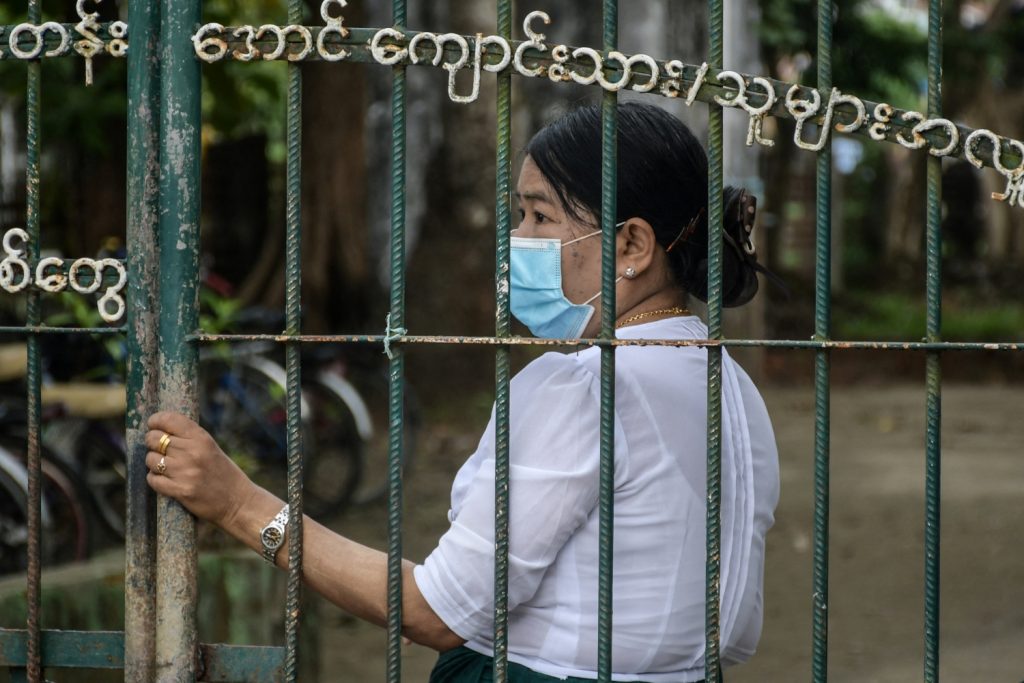
Teaching submission
After the 1962 coup, all public and private schools were nationalised and Buddhist monastic schools were also eventually forced to close. Every school came under the control of the Revolutionary Council and students were required to pay homage daily to the “Five Gratitudes”: Buddha-Dhamma-Sangha, parents and teachers. Dhamma-Sangha means “truth” (dhamma) taught by the Buddhist monks (sangha), and this effectively taught children that no figure in authority is to be challenged.
After the SLORC, the new regime rolled out nationalistic propagandistic content paired with rigid practices in basic education schools; the new content aimed at exalting the military for what it saw as the heroic sacrifices it had made time and time again to save the country.
New classroom practices, including the constant recitation of a changing series of oaths of loyalty, relentlessly instilled in students their duties and obligations to authorities and their lowly place in the hierarchy.
Reporting to school officials on other students’ misbehaviour was also highly incentivised by means of awards, competitions, and public praise – unsurprising given that control over education was centralised under the director of military intelligence, Lieutenant-General Khin Nyunt.
SLORC reopened monastic schools and encouraged monasteries to teach small children in rural areas the basics of literacy, with the aim of also turning them into good, easily-controlled Buddhists who would be aware of the inevitable karmic harm of challenging authority. This shift came after years of purges of monks involved in the 1988 uprising, resulting in a monkhood that was arguably the only national institution as hierarchically inflexible as the military, and largely under its thumb.
In addition to the aforementioned efforts by the current junta to force children back to school, the Department of Higher Education has now promoted any pro-coup person available to tutor and lecturer level.
Under the SAC, universities reopened on January 6 of this year, although most student unions have persuaded their colleagues to boycott. For those who did return, instruction quality has reportedly dipped to an all-time low, even compared to the already gutted higher education of the past several decades.
The next step will likely be to substantially multiply the number of students in distance education: a system in which students do not attend campuses, but rather stay at home and received course materials via mail.
After the September 1988 coup d’etat, the SLORC set about diagnosing the causes of the anarchy that prevailed in the 1987-1988 protests and came to the conclusion that students congregating in dormitories on university campuses far from their parents and heads of household was responsible for large-scale incitement.
The solution was to keep students under the disciplinary responsibility of their parents and grandparents at home. Between 1988 and 2004, Myanmar went from having zero distance education students to hundreds of thousands. Meanwhile, the two most politicised universities from 1988, Mandalay and Yangon, were emptied of students.
It is possible that the SAC will follow SLORC in massively expanding the number of universities. Throughout the 1990s, massive construction was undertaken all over the country to create a façade of universities everywhere, though many sat completely empty for more than a decade. Ministries were encouraged to turn even the most rudimentary of training programs into “universities”, leading to 182 universities being run by 12 ministries, in addition to the Ministry of Education.
The point was that successful matriculants would not fraternise with potentially anti-military, politicised students, but instead would attend the “university” nearest home, or even attend from home through distance education.
Given the role of young people generally and student unions in particular in the current revolution, it is likely the SAC will look for ways to limit opportunities for young people to interact or find solidarity with one another.
Useless degrees
Another page of the playbook is to create PhD programmes regardless of the university staff’s qualifications, with the goal of producing home-grown PhDs to ensure that the next generation of university faculty are “authentically Myanmar” – that is, uncontaminated by foreign PhD programmes.
On January 20, the Global New Light of Myanmar carried an announcement that the head of state had declared that “arrangements will be made to open at least one PhD programme … in each region and state”.
Gustaaf Houtman, a renowned anthropologist of Myanmar religion and education, described this kind of objective as being carried out under a broader campaign of “Myanmafication” – a wide range of strident, grinding, daily messaging, practices and performances aimed at creating a homogeneous image of Myanmar throughout the country that reflect the military’s visions of a “Myanmar” that dated back to the great unifying kings of centuries ago.
In this narrative, British colonialism corrupted Myanmar’s divine path, and the SLORC was reestablishing it. Houtman writes of constant displays of reverence for Buddha and of making merit as the government’s attempt at legitimation by demonstrating its wealth, power and patronage, another legacy the SAC has picked up.
SLORC, according to Houtman, saw as its objective the making of a whole new “mental culture”. Thus in higher education, the only faculty with PhDs would have been “state scholars”, sent abroad by the prior Socialist government and therefore already steeped enough in the Five Gratitudes to be safe mentors to the young. No other academics with foreign PhDs were allowed to teach in Myanmar’s burgeoning universities, to keep out dissidents possibly sent by foreign powers to harm the country.
Another playbook strategy the SAC is now following: a shortened academic year in which students do not attend with any regularity, and are taught mostly by underqualified lecturers who know that military intelligence plants could be in attendance in their classrooms. In addition to that, the junta’s Ministry of Education is also offering much easier university (as well as matriculation) exams, allowing the junta to announce unprecedentedly high pass rates.
The watering down of higher education in this manner in the past explains the large number of taxi drivers, gardeners and other informal workers with bachelor’s degrees whose qualifications are considered by most formal employers to be worthless.
Examples abound: a housekeeper who once worked for me studied law 20 years ago at one of these empty “new” universities, and has never found work in the formal sector. Graduates of the University (formerly “Institute”) of Foreign Languages with bachelor’s degrees in Japanese, English, or French cannot speak a word of those languages, and many note that neither could their instructors.
If the SAC continues on this path, in the economic collapse of post-coup, post-COVID Myanmar, millions of citizens will hold university degrees that will neither ensure them a job, nor provide even minimum wage.
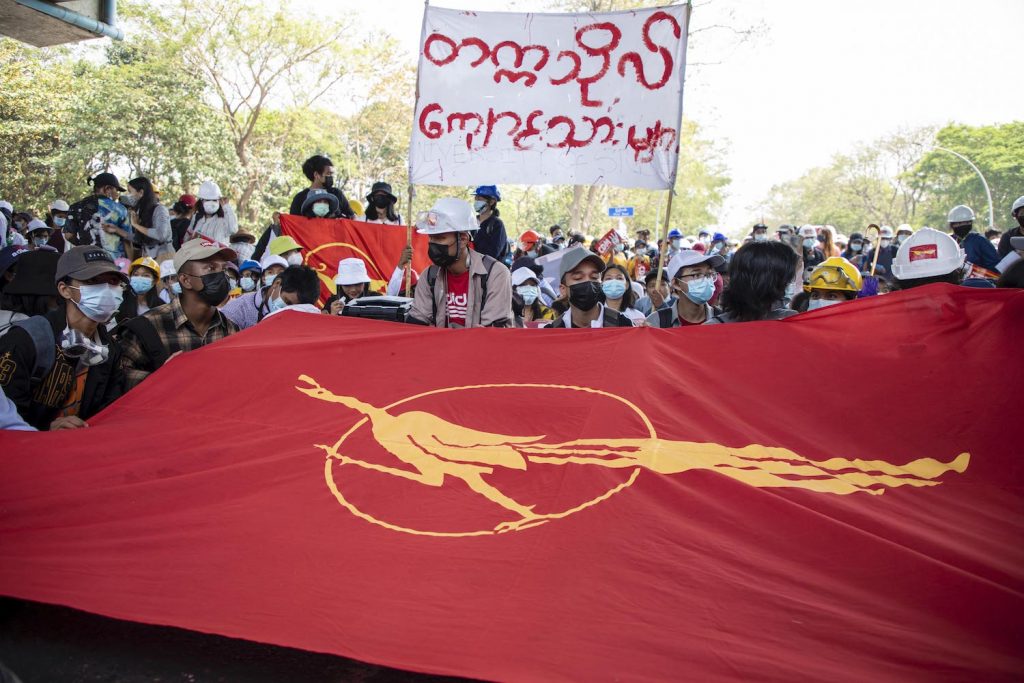
Another generation brainwashed
Unless the SAC’s reforms are stopped, at least another generation of bright young Myanmar students will meet the same fate.
The SAC will inevitably follow past juntas by messaging the opposite: that it, unlike the NLD, has done nothing but dramatically improve education.
But as has been clear for six decades, the major point of all military education policy has been to create brainwashed, pacified subjects, not a citizenry capable of even the slightest bit of critical thinking.
The SAC also seems to think it can continue down the path of SLORC and its successor, the State Peace and Development Council, on moving basic and higher education closer to a student’s family home, following the assumption that household heads will forbid subversive political activities and local officials can clamp down hard on unruly students.
This part of the playbook worked to some extent in the aftermaths of both the 1962 and 1988 coups, as thousands of young dissidents were killed, imprisoned or chased out of the country and the heads of families especially in Myanmar’s central lowlands clamped down on the politicisation of youth under their authority. In “heartland” places like Mandalay, Magway, Sagaing, Bago, Yangon and Ayeyarwady regions, where Buddhist Bamar outnumber other ethnic and religious groups, parents, teachers, workers, religious leaders all learned the red lines never to be crossed and enforced them amongst younger generations.
But brainwashing and the remaking of mental culture turn out to be a whole lot harder than the army’s Psychological Warfare Department and successive junta education leaders anticipated. Many leaders of protests in 1974, 1988, 1996, 2007 and others were products of this system.
Now, however, a return to standard operating practices in education represents yet another colossal military miscalculation. Since reforms began in 2011, including the introduction of cheap and widely available SIM cards and smartphones, and the availability to travel abroad for work or education in safe and legal ways, whatever isolation Myanmar’s citizens had experienced under oppressive regimes was broken for good.
Beyond that, it is no longer clear that household hierarchies remain so rigidly conservative, and indeed the large death toll in older age groups during the COVID-19 pandemic in 2021 killed off many of the very household heads expected to shut down the younger generation’s political activities. Although much of the anti-coup resistance is populated by leaders and followers in their teens, 20s and 30s, who historically would have been locked down by older generations in the household, anecdotal reports suggest that older people in fact are flocking alongside youngsters to anti-coup rallies, especially in the Buddhist-Bamar heartland.
Looking ahead, a few suggestions. First, do not demonise the teachers who did go back to work. Remember that many of this almost entirely female profession are the sole breadwinners for multigenerational households. Although they almost fully boycotted the June 1 SAC attempt at re-opening of schools, for many the two months of COVID-19 that followed wiped out their family savings. Then, in October, police and local authorities visited many teachers’ homes to threaten them and their families if they did not return to school. Unfortunately, many of those visits were followed by similarly threatening messages from local defence forces, who told the very same teachers that they would not tolerate their return to the “military slave education” system.
Second, under no circumstances should schools anywhere be targets of any kind of violence or camps for any armed actors. As Frontier has pointed out, just like the teachers, students in all age groups and their parents face an impossible choice between keeping their children at home and sending them to school. Yes, it is true that parents with the means to hire private tutors or to pay for broadband internet can make use of other sources, including links to basic education curricula approved by the National Unity Government on its Facebook page. But much of the population either lives in areas where the internet is inaccessible or there is no electricity, or have seen a decline in incomes that means they have little money left for anything but food. After two years of no education, the state school may be the only choice for these students’ parents.
Third, there is no place for responsible international assistance to the SAC public education sector. Aspirations by protest leaders and anti-coup groups to create online curricula in major languages (not just Burmese) of the country are worthwhile, although the new Cyber Law (not yet enacted) may lead to streaming sites being blocked or criminalised. But the effort will be worth it. In place of the floppy disks in the 1990s and the CDs of the 2000s that were loaded with dissident materials that were widely shared across the country, memory sticks, SD cards and the like will make curricula transferrable and easier to hide at checkpoints. Access to qualified instructors will still be difficult, but after decades of navigating dangerous political and educational systems, parents and their older children will become increasingly aware of where the red lines are for pushing back on oppression – and identifying who it is safe to trust.


